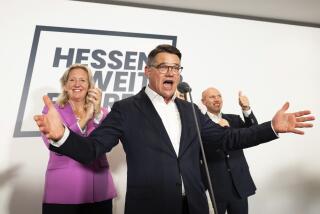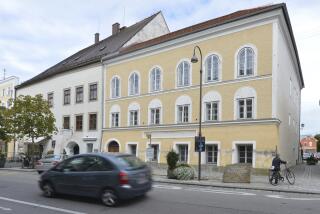From the archives: Honecker Quits; E. Germany May Change Course
BONN -- Embattled East German leader Erich Honecker resigned Wednesday under increasing pressure and was succeeded by Egon Krenz, a Politburo member regarded as a hard-liner, who indicated he will chart a new course.
Honecker, 77, has been ailing since a gall bladder operation in August, and he has been under fire from his colleagues because of a refugee crisis that has touched off massive nationwide demonstrations for political and economic reforms.
His successor, Krenz, 52, the youngest member of the Politburo, formerly directed the Communist youth organization and internal security. Like Honecker, he is considered a hard-line Communist, but he said in a television interview Wednesday that his government will “begin a change of direction.”
In a statement read before television cameras late Wednesday, Krenz urged East Germans to work harder, saying: “The first precondition . . . is a realistic appraisal of the situation. It is clear we have not realistically enough appraised social developments in our country in recent months and not drawn the right conclusions quickly enough.”
East German television interrupted its regular programming to announce Honecker’s decision to step down and the Central Committee’s appointment of Krenz to succeed him as head of government, chief of party and chairman of the national defense council.
At the same time, the Politburo dismissed two of its members, Guenter Mittag, 63, who has been in charge of economic policy, and Joachim Herrman, 56, director of the news media. They have been sharply criticized for the worsening economic situation and the media coverage of it, and for the popular demonstrations against East German policies.
Their dismissal was widely interpreted as an effort to silence the growing public demand for improved living conditions and a free press.
Honecker, who directed construction of the Berlin Wall in 1961, had ruled East Germany and its 16.6 million people since 1971, when he was raised to the top party post. He resisted political and economic reforms, even though Soviet President Mikhail S. Gorbachev pressed for them.
Gorbachev sent congratulations to Krenz from Moscow, saying his selection was a prompt reaction to the “demands of the times to follow a course of national renewal.”
Gorbachev said he is confident that the new East German government “will find the solutions that are so much needed to the difficult issues (it) is facing.”
In Washington, President Bush said that “whether this is a step toward more openness, it’s way too early to say,” and he added that Krenz has been “very much in accord” with Honecker’s hard-line policies.
West German Chancellor Helmut Kohl said he hopes that Krenz’s appointment will open the way to a better life for the East German people.
“General Secretary Krenz will be measured,” he said, “by whether he and the East German leadership pave the way for long-overdue reforms or stick to a simple defense of their monopoly of power. The East German people’s desire for reform cannot be limited to a simple exchange of personnel.”
In East Berlin, one of the leading opposition groups, New Forum, which has signed up about 26,000 supporters of its statement of reformist principles, said Krenz’s appointment indicates that the Politburo has in mind no serious changes.
“It is improbable,” New Forum said in a statement, “that Egon Krenz will set the reform movement in East Germany in motion. He is, after all, responsible for many things in East Germany, which makes him very suspect.”
Krenz said on the telecast that “we face work--work, work and more work--but work that should bring pleasure and serve all the people.” He said he is taking on “a difficult task in complicated times.”
The television interviewer said Krenz had told the Central Committee that “with today’s meeting we will begin a change of direction and in particular regain the political and ideological offensive.”
The West German newspaper Bild, which had correctly forecast Honecker’s resignation, said Wednesday that Krenz plans to introduce a policy of unrestricted travel for East Germans in the near future.
Honecker, in his resignation statement, cited the uncertain condition of his health and added:
“I consider the foundation and the successful development of the socialist German Democratic Republic, whose achievements we took stock of on the 40th anniversary, to be the crowning of the struggle of our party and of my own work as a Communist.”
Honecker, the son of a Saarland miner, became a Communist agitator in his teens. He spent 10 years in prison under the Nazis and then after World War II helped to found the Communist state of East Germany.
He headed the Communist youth movement and was security chief under party leader Walter Ulbricht.
Honecker seemed to reach the pinnacle of recognition and esteem with his visit to West Germany two years ago. But since then, the economy has faltered and he has seemed to be out of tune with the times. The 40th anniversary celebrations, on Oct. 6 and 7, were marred by widespread demonstrations.
It was his view, as articulated by party ideologue Otto Reinhold, that without a regime of strict state socialism there was no justification for the separate existence of the state of East Germany.
Honecker resisted the changes suggested by Gorbachev, reforms that are being carried out in Poland and Hungary as well as in the Soviet Union. He seemed genuinely surprised by the mass demonstrations calling for more freedom.
Krenz, Honecker’s protege, studied to be a teacher, entered the party early, and became head of the Communist youth organization, the FDJ, before taking over the state security apparatus.
In 1984, he was named one of eight deputy heads of government, and he has followed Honecker’s stern, unyielding policies in regard to reform. Little is known about how flexible he may be in the top post.
A sallow man with thick, graying hair and a dour sense of humor, he is not a popular figure--not with the people and not with his peers.
BACKGROUND
East Germany under Erich Honecker has been one of the holdout hard-line Communist nations along with Czechoslovakia and Romania, rejecting the kind of reform being carried out in the Soviet Union, Poland and Hungary. Tens of thousands of its people have fled to the West this year because of the bleak economic and political outlook, and massive demonstrations have demanded change. Wednesday’s change in leadership may bring a new course.
More to Read
Start your day right
Sign up for Essential California for news, features and recommendations from the L.A. Times and beyond in your inbox six days a week.
You may occasionally receive promotional content from the Los Angeles Times.






